Tradition
About Andrew Cusack
 Writer, web designer, etc.; born in New York; educated in Argentina, Scotland, and South Africa; now based in London.
Writer, web designer, etc.; born in New York; educated in Argentina, Scotland, and South Africa; now based in London. read more
News
Blogs
Reviews & Periodicals
Arts & Design
World
France
Mitteleuropa
Knickerbockers
Argentina
The Levant
Africa
Cape of Good Hope
Netherlands
Scandinavia
Québec
India
Muscovy
Germany
Academica
‘Flying High’
[I came across this piece by Taki whilst trawling through the Cusack archives, and I thought now would be the appropriate time to share it.]
By Taki Theodoracopulos (The Spectator, 22 April 2006)
Do any of you remember a film called The Blue Max? It is about a German flying squadron during the first world war. A working-class German soldier manages to escape trench warfare by joining up with lots of aristocratic Prussian flyers who see jousting in the sky as a form of sport, rather than combat. Eager for fame and glory — 20 confirmed kills earns one the ‘Blue Max’, the highest decoration the Fatherland can bestow — the prole shoots down a defenceless British pilot whose gunner is dead. His squadron leader is appalled. ‘This is not warfare,’ he tells the arriviste. ‘It’s murder.’
I know it’s only a film, and a Hollywood one at that, but jousting in the air was a chivalric endeavour back then, with pilots who crash-landed behind enemy lines being treated as honoured guests before being interned for the duration. The man who embodied all the chivalric virtues was, of course, Manfred von Richthofen, whose family had been ennobled by Frederick the Great in the 1740s. When Baron Richthofen became a fighter pilot in the late summer of 1916, it was still only 13 years since the first flight of Orville Wright. The technique of applying air power to warfare was barely understood. One looped-the-loop, and pilots who managed to shoot down enemy aircraft and survive were regarded as heroes and quickly accumulated chestfuls of medals. When the Red Baron (his plane was painted a dark red, hence the nickname) died on 21 April 1918, the Times for 23 April devoted one third of a column to England’s fallen enemy, remarking that ‘all our airmen concede that Richthofen was a great pilot and a fine fighting man’.
By the time of his death, the Red Baron had notched up 80 victories, a record, with the leading French ace, René Fonck, claiming to have shot down 157 German aircraft, but only 75 being confirmed. (Rather French, that.) Needless to say, the mystery surrounding Richthofen’s death added to his legend. No one knows for sure who shot him down, or even if the bullet which killed him came from the ground. The English who found his body treated it with all the ceremony they would have accorded one of their own. An honour guard escorted the corpse to his own lines and British pilots overflew and dipped their wings. Those were the days. Out of 8 million men of his generation who died in that useless war, Richthofen’s is among the few names which will most likely be remembered by the general public on the 200th anniversary of his death.
His brother Lothar and his cousin Wolfram (who bombed Stalingrad 25 years later, and was one of Hitler’s favourites) flew alongside the baron, establishing a tradition for excellence and gallantry in the Luftwaffe. The second world war saw great heroics by German pilots, starting with Hans Ulrich Rudel, with something like 400 Stalin tanks to his credit, Adolf Galland, Erich Hartmann, who shot down 352 Soviet aircraft in the course of 1,500 missions, and Walter Novotny, with 250 Soviet aircraft in fewer than 450 missions.
My favourite is, of course, Prince Heinrich Sayn-Wittgenstein, whose heroics overshadowed the rest, and whose plane was shot down at the very, very end of the war in Schonhausen, the Bismarck home. Wittgenstein had his crew bail out first but was unconscious when he hit the ground. He had been hit while in the cockpit. By the end of the war he had become such an ace and legend he could do what he pleased. He once flew a combat mission with a raincoat over his dinner jacket. A few days before he had been to Hitler’s headquarters to receive the Oak Leaves to his Knight’s Cross. He told the beautiful Missie Vassiltchikov on the telephone, ‘Ich war bei unserem Liebling’ (I have been to see our darling) and added how surprised he was his handgun had not been removed before he entered ‘the Presence’. Heinrich would have loved to have bumped him off, but by then Germany was ruined and the prince died three days later. Hitler had many heroic pilots grounded towards the end, but Wittgenstein, being noble, was kept flying.
Why am I bringing all this up in the year of Our Lord 2006? As I told you last week, while down in Palm Beach, a friend of mine, Richard Johnson, tied the knot with Sessa von Richthofen, and I flew down a group of friends for three days of non-stop celebrations. The couple exchanged vows on an 80-year-old river boat which plies its trade in the inland waterway which crisscrosses Florida. My speech went down great, but then some ghastly paparazzo by the name of Harry Benson went around complaining about it. Never to me, needless to say, otherwise one more kill would have been added to the Richthofen legend.
“Der Rote Baron”
Foreign Film Fictively Frames Favorite Fabled Freiherr

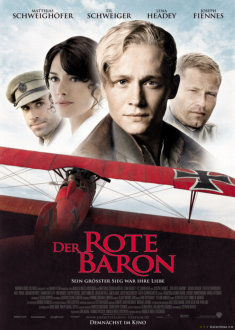 Our cunning cousin, the Hun, has cleverly concealed a card up his hunting-jacket sleeve. Just when you thought the continual winging by hand-wringing Germans about their militarist past (or at least the thoroughly shameful parts thereof) would never end, a new film depicts the life of the dashing Manfred Albrecht Freiherr von Richthofen: better known to us as The Red Baron.
Our cunning cousin, the Hun, has cleverly concealed a card up his hunting-jacket sleeve. Just when you thought the continual winging by hand-wringing Germans about their militarist past (or at least the thoroughly shameful parts thereof) would never end, a new film depicts the life of the dashing Manfred Albrecht Freiherr von Richthofen: better known to us as The Red Baron.
“Der Rote Baron” is showing in den deutschen Kinopalästen as we speak, but the motion picture was not actually meant for a German audience: this is but part of the clever ruse. The film was actually made in English and then dubbed back into German by the mostly Allemanic cast.
Having convinced us of their peaceful intentions through more than a half-century of “Guys, we really messed up circa 1933-1945”, the obvious intent is to swamp the English-speaking world with a film depicting the charming gentlemen fighters of the first weltkreig in order to disarm us as they prepare for their dastardly plans.
Why, as we speak, Georg Friedrich von Preussen is polishing his pickelhaube and dusting off his feather cap in preparation for this latest Prussian plot for world domination. While the Western world worried itself sick over global Islamism and the Chinese threat, little did we know that a swelling irredentism was brewing deep within the hearts of every Berliner; a tear developing in the eye at the mere mention of Tsingtao; a soul in mourning for the loss of Tanganyika. How naïve we were not to realize that all those bright young Germans spending their gap year teaching smiling Herero natives in Namibia were actually forward units of intelligence-gatherers yearning for the return of Ketmanshoop and Swakopmund to the Germanic fold.
Victoria Day – Fête de la Reine
The Official Birthday of the Queen of Canada
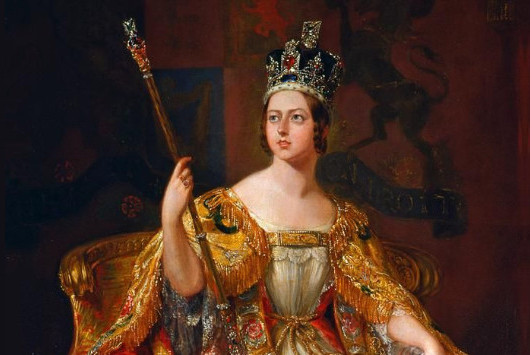
ELIZABETH II will have had, in her lifetime, more birthdays than Methuselah. This is because, in addition to the actual date of her birth, April 21, 1926, she has several different days which are designated as the Sovereign’s Official Birthday. In Britain, her birthday (which is the official national day of the United Kingdom) generally falls on the first or second Sunday in June and is the occasion of the ceremony of Trooping the Colour. Australia celebrates her birth on the first Monday in June with a public holiday, except for in Western Australia, where it is usually either the last Monday in September or the first Monday in October. This is the day when the latest members of the Order of Australia are announced. New Zealand also holds the Sovereign’s Birthday on the first Monday of June. Fiji is now a republic but Elizabeth II remains ‘Paramount Chief of Fiji’ and so a Monday in June is declared a holiday each year to commemorate her birth.
From “A Suburban Country Place”
Claremont, at the end of Riverside Drive, near the tomb of General Grant, suggests in a rather humble way what these mansions were, and in a very magnificent way what their outlooks were. Others linger, desecrated, here and there, closely pressed by new-laid brick and stone. And away up at the extreme tip of Manhattan there are still a few quiet, shady places which may call themselves suburban in the old and honorable sense. But everywhere else around the outskirts of Manhattan the term has gained an unattractive, hybrid meaning. To speak it with pleasure, New-Yorkers must apply it to those remoter regions which can be reached only by a railway journey of considerable length. And then it is incorrectly applied, for a real suburban place is rural in aspect, but urban in convenience — private, green, and peaceful in itself, yet close in touch with the true self of the town. …
“A Suburban Country Place”
The Century Magazine,
May 1897
Philipp Freiherr von Boeselager, 1917-2008
Catholic Nobleman, Forester, Knight of Malta, Plotted to Kill Hitler
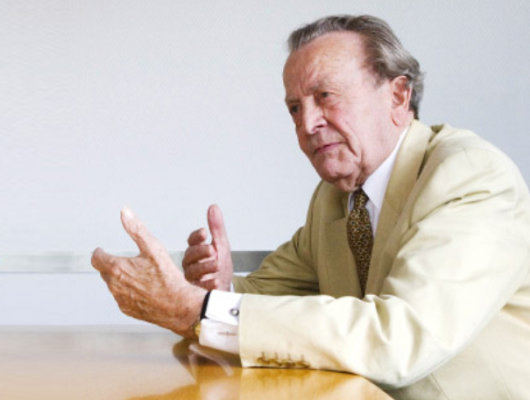
Philipp Freiherr (Baron) von Boeselager, the last surviving member of the conspiracy of anti-Nazi German officers, has died at 90 years of age. The freiherr‘s background and upbringing were distinctly Catholic. The Boeselagers are a Rhenish family with Saxon origins in Magdeburg. Philipp was the fourth of eight children and was educated by the Jesuits at Bad Godesborg. His grandfather had been officially censured by the Imperial German goverment for publically taking part in a Catholic religious procession.
Boeselager had most intimately been involved in the March 1943 plot to assasinate Hitler and Himmler when the the Fuhrer and the SS head were visiting Field Marshal Günther von Kluge on the Eastern Front. Boeselager, then a 25-year-old cavalry lieutenant under the Field Marshal’s command, was to shoot both Hitler and Himmler in the officers mess with a Walther PP. Himmler, however, neglected to accompany Hitler and so the Field Marshal ordered Boeselager to abort the attempt fearing that Himmler would take over in the event of Hitler’s death, changing nothing.
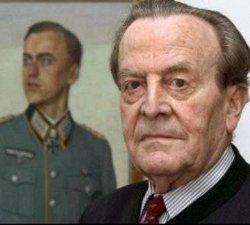 «Each day Hitler ruled, thousands died unnecessarily — soldiers, because of his stupid leadership decisions. And later, I learned of concentration camps, where Jews, Poles, Russians — human beings — were being killed.»
«Each day Hitler ruled, thousands died unnecessarily — soldiers, because of his stupid leadership decisions. And later, I learned of concentration camps, where Jews, Poles, Russians — human beings — were being killed.»
«It was clear that these orders came from the top: I realised I lived in a criminal state. It was horrible. We wanted to end the war and free the concentration camps.»
Boeselager later procured the explosives for the famous July 1944 plot (the subject of the upcoming film “Valkyrie“), under the cover of being part of an explosives research team. He handed a suitcase with the explosives on to another conspirator. When the bomb exploded in Hitler’s conference room, Boeselager and his 1,000-man cavalry unit made an astonishing 120-mile retreat in under 36 hours to reach an airfield in western Russia from where the aristocrat would fly to Berlin to join the other conspirators.
At the airfield, however, he received a message from his brother (Georg von Boeselager, a fellow cavalry officer who was repeatedly awarded for his consistent bravery on the battlefield) saying “All back into the old holes”, the code signifying the failure of the coup. Even more astonishingly than his swift retreat was his return, with his unit, to the front quickly enough not to raise any eyebrows. As a result, he was not known to be part of the conspiracy and escaped the gruesome tortures and executions dealt to many of his fellow conspirators.
After the war, his role in the plot was revealed and Philipp von Boeselager was awarded the Legion d’honneur by France and the Great Cross of Merit by West Germany. He joined the Order of Malta in 1946, eventually co-founding Malteser Hilfdienst, the medical operation of the German knights of the Order, and helping coordinate German pilgrimages to Lourdes.
The greater part of his post-war years was spent in forestry, and Boeselager served as head of the Arbeitsgemeinschaft Deutscher Waldbesitzerverbände (the coordinating body of private and cooperative forest-owners) from 1968 to 1988. Coincidentally, he was succeeded in that post by Franz Ludwig Schenk Count von Stauffenberg, the son of the July ’44 plot mastermind.
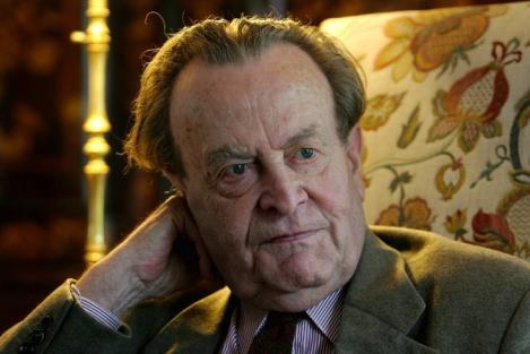
La principessa, non la senatrice

 Isn’t it a shame that the citizens of Rome & Lazio neglected to choose Princess Alessandra Borghese as their senator? Our favorite inhabitant of the Palazzo Borghese is a sound Catholic, is good friends with the Pope, and was seen from afar during our first pilgrimage to Rome; good enough reasons to get my vote. While the UDC won a respectable 36 seats in the population-based Chamber of Deputies (an acceptable loss of 3 seats since the last election), la Principessa was a candidate for the regionally-based Senate, in which the UDC won only 3 seats, a loss of 18 since the 2006 elections.
Isn’t it a shame that the citizens of Rome & Lazio neglected to choose Princess Alessandra Borghese as their senator? Our favorite inhabitant of the Palazzo Borghese is a sound Catholic, is good friends with the Pope, and was seen from afar during our first pilgrimage to Rome; good enough reasons to get my vote. While the UDC won a respectable 36 seats in the population-based Chamber of Deputies (an acceptable loss of 3 seats since the last election), la Principessa was a candidate for the regionally-based Senate, in which the UDC won only 3 seats, a loss of 18 since the 2006 elections.
Another young royal vied for a parliamentary seat in the recent Italian election, but you will have to wait until the next Norumbega for our little overview of the results.

“Valkyrie”

No, this isn’t a photograph of the latest Norumbega staff meeting, it’s a publicity shot from the upcoming United Artists film, “Valkyrie”. The film tells the story of Claus Philipp Maria Schenck von Stauffenberg, the heroic German Catholic noble who was the mastermind behind the July 20 plot against Hitler. Needless to say, there has been much anticipation over this film, especially since the lead role went to Tom Cruise, who has never quite got the knack of acting. Like Jeremy Irons, he seems to believe that completely different characters require little or no change in performance, but is mysteriously still making films nonetheless. (Cruise at least has the excuse of being a Scientologist to explain his success… what’s Jeremy Irons’s?).

Despite the poor choice of Mr. Cruise play Count Stauffenberg, the rest of the cast includes some pretty inspired choices. Playing Countess Nina von Stauffenberg is Carice von Houten (above), whom you will remember from “Zwartboek”. She’s joined by fellow “Zwartboek” actor Christian Berkel (top photo, seated far left), who played the evil General Kaütner in the Dutch film, the character responsible for the downfall of the good German, General Müntze, who was played by Sebastian Koch (better known for his role in the hit “Das Leben der Anderen”) who (pause for breath) actually played Count Stauffenberg himself in a 2004 German television production called “Stauffenberg”. Speaking of downfalls, Berkel (we’re back to him now) also played a nasty Nazi in the 2004 film “Downfall” depicting the last few days in Hitler’s bunker. [Correction: Berkel actually played Dr. Ernst-Günter Schenck, one of the good guys.] Some more of the cast…
(more…)
A Miracle from Blessed Charles
Vatican to Review Case of Inexplicable Healing of Florida Woman
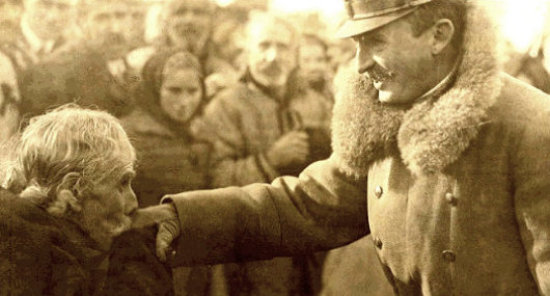
The seemingly inexplicable healing of a Baptist woman from Florida may provide the miracle necessary for the canonization of Emperor Charles of Austria. The woman, in her mid-50s, suffered from breast cancer and was bedridden after the cancer had spread to her liver and bones. Despite treatment and hospitalization, doctors diagnosed her case as terminal. But after intercessory prayers to the Emperor Charles, the woman (who wishes to maintain her privacy and remain unnamed) was completely healed.
The story begins when Joseph and Paula Melançon, a married couple from Baton Rouge, Louisiana and friends of the healed woman, travelled to Austria, where they met Archduke Karl Peter, son of Archduke Rudolf, and grandson of the holy Emperor Charles. The Archduke invited the couple to his grandfather’s beatification in Rome in 2004. Mrs. Melançon gave the novena to Blessed Charles to her sister-in-law, Vanessa Lynn O’Neill of Atlanta.
“I knew that when I got that novena — I knew that my mother’s best friend was sick — I just knew at that moment that it was something I was going to do,” Mrs. O’Neill told the Florida Catholic in an interview. “And that is how I got started, I just prayed the novena.”
The woman’s recovery was investigated by an official church tribunal consisting of Father Fernando Gil (judicial vicar of the Diocese of Orlando), Father Gregory Parkes (chancellor of canonical affairs of the Diocese), Father Larry Lossing, diocesan notary Delma Santiago, as well as an unnamed medical doctor. The tribunal examined the evidence at hand and invited the participation of medical experts, who could find no earthly explanation for the woman’s recovery.
“Other alleged miracles attributed to the intercession of Blessed Karl I are currently being investigated in different places in the world,” Fr. Gil said.
The sixteen-month investigation has now concluded, and the conclusions have been signed by the participants, sealed, and placed in special boxes which are then themselves tied, sealed with wax, and sent to the Congregation for the Causes of the Saints in Rome via diplomatic pouch. The Congregation will examine the case further and then present its findings to Pope Benedict XVI, who will decided if a miracle has taken place. If the Pope is convinced by the evidence, then the Emperor’s canonization can proceed.
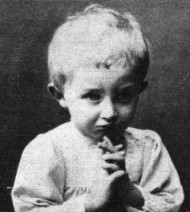 The future emperor, 1889 |
Blessed Charles’s reign as Emperor of Austria and Apostolic King of Hungary began in November 1916 during the First World War. The Emperor realized the heavy toll the Christian countries were suffering and almost immediately began to make peace manouevers. The insane obstinacy of both his German allies and the enemy alliance of France, Great Britain, and the United States, however, meant that Charles’s multiple attempts to negotiate a mutually-acceptable end to the war were not even considered.
After the war, President Woodrow Wilson insisted on dismantling the Austro-Hungarian Empire and the Emperor was forced into exile, first in Switzerland and finally, after two attempts to regain his Hungarian throne, on the Portuguese island of Madeira. Charles had always been particularly devout, and his devotion to God only increased when he caught a severe case of pneumonia on Madeira. He died from the illness in April 1922.
The English writer Herbert Vivian wrote that Charles was “a great leader, a prince of peace, who wanted to save the world from a year of war; a statesman with ideas to save his people from the complicated problems of his empire; a king who loved his people, a fearless man, a noble soul, distinguished, a saint from whose grave blessings come.”
Even Anatole France, the radical French intellectual and novelist, wrote “Emperor Karl is the only decent man to come out of the war in a leadership position, yet he was a saint and no one listened to him. He sincerely wanted peace, and therefore was despised by the whole world. It was a wonderful chance that was lost.”
Recent history has come to fulfil the expectations of Pope St. Pius X, who received Charles when the Austrian was a young archduke and not in direct line to succeed to the throne, saying “I bless Archduke Charles, who will be the future Emperor of Austria and will help lead his countries and peoples to great honor and many blessings–but this will not become obvious until after his death.”
You call this journalism?
The decline of the British newspaper, continued
THE DAILY TELEGRAPH is asking its readers to believe that Gordon Brown is going to repeal the Act of Settlement barring Catholics from the throne and that furthermore this would make Franz, Duke of Bavaria the heir to the throne of England (c.f. “Act repeal could make Franz Herzog von Bayern new King of England and Scotland”, by Richard Alleyne and Harry de Quetteville, Daily Telegraph, 7 April 2008). In reality, the British Parliament does not have the authority to unilaterally repeal the Act, since by convention it must consult with the sixteen commonwealth realms. (Hence why Edward VIII had only the options of either dumping Wallis Simpson or giving up the throne; London had consulted the dominion governments and they said they would not accept Mrs. Simpson as Queen, end of story). Thus Gordon Brown would actually need to consult with and receive unanimous approval from the governments of Antigua and Barbuda, Australia, the Bahamas, Barbados, Belize, Canada, Granada, Jamaica, New Zealand, Papua New Guinea, St. Kitts and Nevis, Saint Lucia, Saint Vincent and the Grenadines, the Solomon Islands, and Tuvalu, in addition to that of the United Kingdom.
Why, then, does the Daily Telegraph neglect to point out this necessity, seemingly obvious to anyone with more than a passing knowledge of the British constitution? Was the newspaper simply ignorant about the subject? If so, why did they choose to print an article about it without seeking further information from the plethora of readily-available sources? Or perhaps the newspaper did know but decided to ignore it in the interests of sensationalism? Either way, the proof is in the pudding: standards at the Daily Telegraph are not what they used to be.
Mourning in Vienna
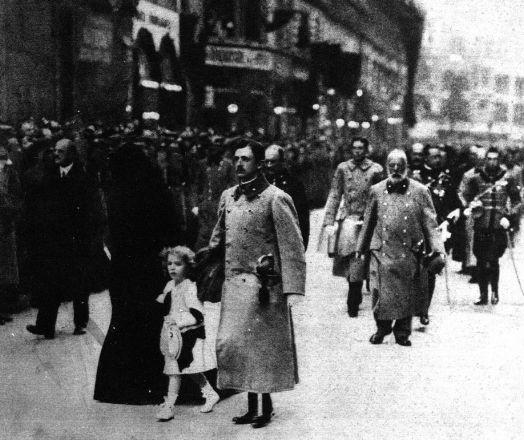
The Blessed Emperor Charles at the funeral of the late Emperor Franz Joseph, the saint’s great uncle, in November 1916. Between the Blessed Charles and his Empress, Zita of Bourbon-Parma, is Crown Prince Otto. Otto lives today, and is the head of the Hapsburg family.
Grant us the grace, with his intercession, to follow his example and serve the true cause of peace, which we find in the faithful fulfillment of Your holy will. We ask this through Jesus Christ our Lord, who lives and reigns with You and the Holy Spirit, one God, forever and ever.
Amen.
Category: Monarchy | Previously: Our Holy Emperor
Uncle Sam Does Osama’s Dirty Work
U.S.-backed Terrorists Complete Their Takeover of Serbian Province
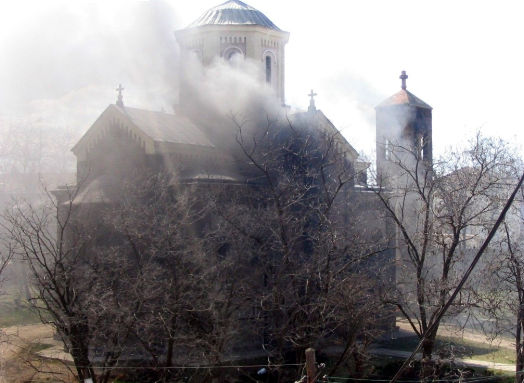
ANOTHER STRIKE AGAINST Christendom’s fragile frontiers: the assembly of the UN-administered Serbian province of Kosovo has unilaterally and illegally declared independence. The United States government, which is bound by its own law to deny recognition to the putative country, nonetheless swiftly extended official recognition to the Kosovar assembly’s declaration. The U.S., which claims to currently be fighting a “Global War on Terror”, has backed the Albanian Muslim UÇK terror group that has run Kosovo for nearly a decade now, and continually encouraged it because Washington views any defeat for the Serbs as by extension a defeat for a Russians; and in Washington’s point-of-view, no matter how irrelevant it is to the actual safety and well-being of we Americans, any defeat for the Russians is a victory for Washington — or “the United States”, as the clique of insipid upper-middle-class bureaucrats supported by the taxes of hard-working Americans likes to style its rule. (Naturally, a complete inversion of this attitude — in which any defeat for America is regarded as a victory for Russia — now reigns in Moscow. After a decade of Washington kicking Mother Russia while she was down, the Ruskies finally took the hint and so we once more have nuclear missiles aimed at our shores.) (more…)
Crown Prince Urges Prayers for Kosovo
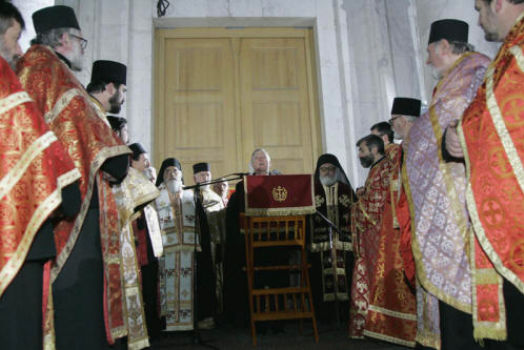
BELGRADE, 18 February 2008 – Their Royal Highnesses Crown Prince Alexander II and Crown Princess Katherine attended this afternoon at St. Sava Temple a public prayer for the salvation of the Serbian people in Kosovo and Metohija.
On behalf of His Holiness Patriarch Pavle of the Serbian Orthodox Church, the public prayer was led by His Eminence Archbishop Amfilohije of Cetinje and Metropolitan of Montenegro and Littoral, with the Vicar of His Holiness the Patriarch, His Grace Bishop of Hvostno Atanasije, priests and deacons from Belgrade churches. The performance of the Mokranjac Choir, in the presence of thousands of citizens who came to pray for the well-being for Kosovo’s Serbs and for Kosovo and Metohija, the heart and soul of Serbia, to remain in Serbia.
Many bishops of the Serbian Orthodox Church were present at the public prayer, as well as various officials: HE Mr. Slobodan Samardzic, Minister for Kosovo and Metohija, HE Mr. Radomir Naumov, Minister of Religion, HE Archbishop Eugenio Sbarbaro, Apostolic Nuncio, and others.
After the Holy Liturgy and the Holy Oration, His Eminence Metropolitan Amfilohije and His Royal Highness Crown Prince Alexander addressed the present.
In his speech, the Crown Prince emphasized:
“We are here today in the great Saint Sava Temple. In disbelief and horror. United in pain at a time of great tragedy for our people. I am deeply hurt and shocked. What has happened is a big injustice. What was thrust on our Serbian people is very painful and illegal.
“My wife and I visited Kosovo on Saturday. It was very emotional and sad seeing our dear people. His Grace Bishop Artemije of Raska and Prizren led the prayers in Saint Dimitri Church in Kosovska Mitrovica.
“I stand, as Karadjordjevic, with all my heart by our people in Kosovo and by our Serbian Orthodox Church.
“It is very important that we remain united. Our actions must be peaceful, dignified, diplomatic and legal. We all pray to dear God for negations to continue and that a solution and compromise will be found. Therefore I appeal again for unity and responsibility of all our authorities. Violence or destruction of property will only damage our efforts. Therefore there must not be any violence – this is not Christian, it is not courageous, it is not in our tradition.
“May the Good Lord answer our prayers for the wellbeing of the Serbian people and all others!
“May Almighty God give our Serbia and our people strength and wisdom!”
Source: The Public Relations Office of HRH Crown Prince Alexander II
Archduke Carl Ludwig, 1918-2007
Son of Blessed Charles, U.S. Army Veteran, Fought at Normandy
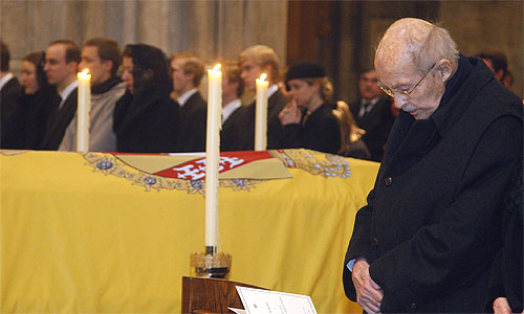
A READER WAS kind enough to bring to my attention the recent death of His Imperial & Royal Highness, Archduke Carl Ludwig Maria Franz Joseph Michael Gabriel Antonius Robert Stephan Pius Gregor Ignatius Markus d’Aviano of Austria, one of the sons of Blessed Charles, the last (up to this point) Emperor of Austria, Apostolic King of Hungary, King of Bohemia, etc. Carl Ludwig’s birth in 1918 was hailed with a 101-gun salute from the imperial field artillery, but the Habsburgs were soon overthrown by a republican element in Vienna and forced into exile. The Archduke studied at the University of Louvain until the outbreak of the Second World War, when the Habsburgs fled to the safety of Quebec.
There, the family were so poor they sometimes had to survive off a soup the Empress Zita cheerfully prepared from dandelions picked in the park. Carl Ludwig, however, was able to complete his studies at the Université Laval, the oldest university in Canada, before being allowed to join the United States Army in 1943. On June 6, 1944, he took part in the D-Day landings in Normandy, and later became aide-de-camp to the Comte de Hauteclocque, a general in the Free French Forces (later known as Maréchal Leclerc), and served with the Algerian spahis. He was discharged from the U.S. Army with the rank of Major in 1947, and in 1950 married Princess Yolande de Ligne.
Christological Vexillology in Louisiana

SINCE BOBBY JINDAL, a traditional Catholic and sometime New Oxford Review contributor, today became the eighty-fourth Governor of Louisiana (sixty-first of the republican era), we decided to share with you the interesting development regarding the Louisiana state flag. Louisiana’s flag consists of a pelican displayed with a scroll bearing the state motto of “Union, Justice, and Confidence”. Heraldically, the pelican is known as a “pelican-in-her-piety” depicting the mother pelican piercing her breast to offer her own blood as sustenance to her children. The “pelican-in-her-piety” is a traditionally Christian symbol meant to parallel Christ’s sacrifice, and so this is why you sometimes see representations of pelicans in churches.

It seems that from about the 1900s onwards, the droplets of blood on the pelican’s breast gradually ceased to be displayed, somewhat diminishing the Christological nature of the state emblem. However, one astute eighth-grader at Vandebilt Catholic High School in Houma, the parish seat of Terrebonne Parish (remember that in la Louisiane counties are called parishes), noticed this problem and informed his representative in the state’s lower house. In April 2006, the Louisiana State Legislature passed an act requiring three drops of blood to be depicted on the pelican, both in the flag and the state seal, and so the significance of the the pelican-in-her-piety is now restored.

The long and the short of it
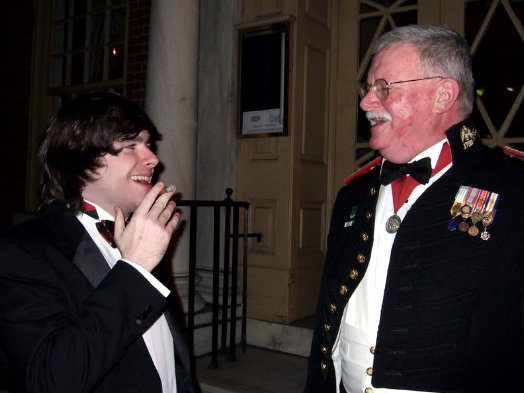
My Uncle Matt and I share a joke outside Fraunces Tavern while the 218th Annual Mess Dinner of the Veteran Corps of Artillery takes place inside.
And before anyone comments, yes I know I need a haircut! (Photo courtesy of Mike Leventhal)
St. George Guards India’s Fleet Once More
In a return to tradition, the old Indian naval ensign is reinstated.

AFTER AN EXPERIMENT with an allegedly more ‘indigenous’ design, India’s traditional naval ensign has been restored, and so the Cross of St George once again snaps from the sterns of the Union’s warships. The old Indian Naval Ensign dated to 1950, when the Indian Union became a republic, three years after achieving dominion status as a wholly self-governing member of the British Commonwealth. The Royal Indian Navy had flown the unaltered White Ensign but with the changeover to a republic it was decided to simply exchange the Union jack in the canton with the national flag of India, retaining the red St. George’s cross on a white field. (more…)
The Queen’s Christmas Message 2007
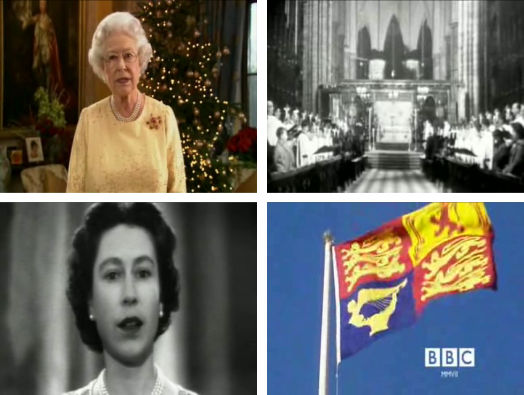
Available here at YouTube.
The Café Society of Ferenc Molnár
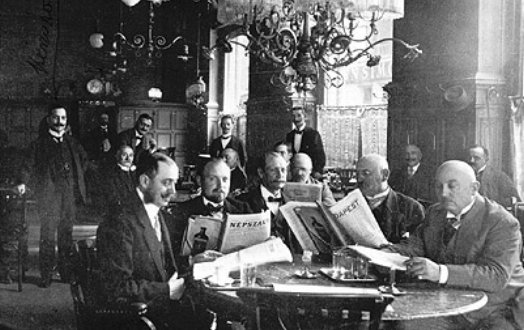
FROM 1887, the Café Central (or Centrál Kávéház, in Magyar) has been a meeting place for artists, intellectuals, professionals, and others located on Budapest’s Károlyi Mihály street. One of its most famous patrons was the novelist and dramatist Ferenc Molnár (born Ferenc Neumann and often anglicized as Franz Molnar), whose 1906 book The Paul Street Boys is perhaps the most widely-read Hungarian novel. His 1909 play “Liliom” was later adapted by Rodgers and Hammerstein into the musical “Carousel”. Both his plays “The Guardsman” and “The Swan” were later made into films (the latter being Grace Kelly’s final appearance on the silver screen), while “The Play at the Castle” was adapted by P.G. Wodehouse into “The Play’s the Thing” and by Tom Stoppard into “Rough Crossing”. (more…)
Krummau on the Moldau
Český Krumlov Revisited
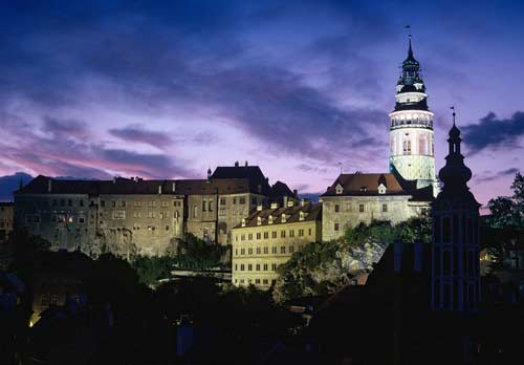
THE CASTLE OF Krummau in Bohemia stands majestically on its crag in a bend of the Moldau river, presiding confidently over the town below. Český Krumlov, as the town is known in the currently-reigning Czech language, began in the thirteenth century under the Rosenberg family and was purchased by the Emperor Rudolf II in 1602. Yet it was under the princely house of Schwarzenberg (proprietors of Krumau from 1719 to 1945) that the castle flourished. The name Český Krumlov means Bohemian Krummau, to differentiate it from a Moravian town of the same name. (It is also often rendered as Krumau or Krumau-an-der-Moldau).
While the advent of Communism deprived the Schwarzenbergs of this great castle and numerous other vast properties of theirs behind the Iron Curtain, the Schwarzenbergs have since regained their natural prominence in Bohemia. His Serene Highness Prince Karl VII of Schwarzenberg, Duke of Krummau, Count of Sulz, Princely Landgrave of Kelttgau currently serves his country as Minister of Foreign Affairs of the Czech Republic, as well as being a member of the Czech Senate which convenes in the Wallenstein Palace in Prague. For the sake of convenience, however, His Serene Highness goes by ‘Karel Schwarzenberg’. (more…)
Theodore Dalrymple on Rhodesia

The young black doctors who earned the same salary as we whites could not achieve the same standard of living for a very simple reason: they had an immense number of social obligations to fulfill. They were expected to provide for an ever expanding circle of family members (some of whom may have invested in their education) and people from their village, tribe and province. An income that allowed a white to live like a lord because of a lack of such obligations scarcely raised a black above the level of his family. […]
It is easy to see why a civil service, controlled and manned in its upper reaches by whites could remain efficient and uncorrupt but could not long do so when manned by Africans who were suppose to follow the same rules and procedures. The same is true, of course, of every other administrative activity, public or private. The thick network of social obligations explains why, while it would have been out of the question to bribe most Rhodesian bureaucrats, yet in only a few years it would have been out of the question not to try to bribe most Zimbabwean ones, whose relatives would have condemned them for failing to obtain on their behalf all the advantages their official opportunities might provide. Thus do they very same tasks in the very same offices carried out by people of different cultural and social backgrounds result in very different outcomes.
Viewed in this light, African nationalism was a struggle for power and privilege as it was for freedom, though it co-opted the language of freedom for obvious political advantage.
The Mandarins and the Masses
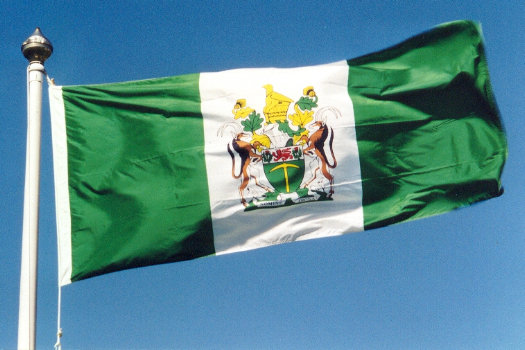
Search
Instagram: @andcusack
Click here for my Instagram photos.Most Recent Posts
- Amsterdam November 26, 2024
- Silver Jubilee November 21, 2024
- Articles of Note: 11 November 2024 November 11, 2024
- Why do you read? November 5, 2024
- India November 4, 2024
Most Recent Comments
- on The Catholic Apostolic Church, Edinburgh
- on Articles of Note: 11 November 2024
- on Articles of Note: 11 November 2024
- on Why do you read?
- on Why do you read?
- on University Nicknames in South Africa
- on The Situation at St Andrews
- on An Aldermanian Skyscraper
- on Equality
- on Rough Notes of Kinderhook
Book Wishlist
Monthly Archives
Categories


